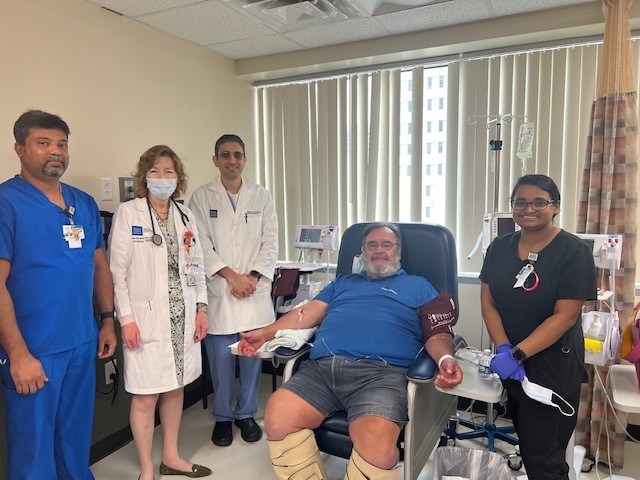
Dan L Duncan Comprehensive Cancer Center clinical trial is a step toward health equity
Javier Perez could be making history in cancer care. He’s the first person to volunteer for a new cell therapy clinical trial headed by Baylor College of Medicine’s Dan L Duncan Comprehensive Cancer Center at Harris Health Ben Taub Hospital and Harris Health Smith Clinic. The study uses cell therapy developed at Baylor’s Center for Cell and Gene Therapy to treat multiple myeloma, a type of blood cancer. This phase 1 and phase 2 trial is likely the first cell therapy clinical trial at a safety-net hospital in the nation, making Mr. Perez a pioneer for equitable care.
While cancer doesn’t discriminate, receiving the best care isn’t always easy, especially for those on Medicare, Medicaid or who lack insurance. Those with private insurance are more likely to have access to potentially life-saving clinical trials and advanced treatments like cell therapy. This is a major issue in Harris County, which leads the nation in the percentage of citizens lacking health insurance.
While Mr. Perez’s trial participation is unique, his circumstances are too common. A native Houstonian, the 62-year-old spent 30 years working for Nabisco, followed by a decade at the Coca-Cola Company, where he was laid off in 2021 during the COVID-19 pandemic. Shortly after the layoff and the loss of his health insurance, COVID struck, necessitating a seven-week hospital stay.
During his hospitalization, Mr. Perez’s legs began to swell uncontrollably. The swelling severely compromised his mobility and quality of life.
“I felt like I was 100 years old. I couldn’t walk. I couldn’t sleep,” he said.
Biopsies on his bone marrow revealed multiple myeloma. However, Mr. Perez had to delay his cancer treatment while undergoing several courses of antibiotics to control his leg swelling and prevent bone infections.
Treatment was further delayed while payment was sorted out. Since his layoff, Mr. Perez collected unemployment benefits to keep up with household bills and expenses. However, the benefits raised his income above the eligibility threshold for the Harris Health Financial Assistance Program, which provides support for medical care for Harris County residents. Eventually, Mr. Perez made the tough decision to stop receiving unemployment in order to start his cancer treatment.
His luck turned in October 2023, when he was referred to Martha Mims, M.D., Ph.D., the cell therapy clinical trial’s lead investigator, who determined he was a good candidate for the study. Dr. Mims is collaborating with Premal Lulla, M.B.B.S., in the Center for Cell and Gene Therapy, which is one of the nation’s leading cell manufacturing enterprises, to develop the cell therapy products used in this trial.
Cell therapy has shown tremendous potential to treat some cancers. It is the most personalized of treatments, involving manipulation of immune system cells from a patient’s blood to recognize cancer cells and destroy them.
“The Duncan Cancer Center is a cancer center for the entire community, including the uninsured community,” said Pavan Reddy, M.D., professor and director of the Center. “We will leverage the strength of Baylor’s Center for Cell and Gene Therapy to offer life-saving treatments to our patients in the Harris Health System.”
After starting treatment in May 2024, Mr. Perez reports that the therapy seems to be working. The swelling in his legs has gone down. He’s had no side effects, and his weekly blood tests are encouraging.
Importantly, he feels seen and cared for by Dr. Mims and her team.
“I can’t say enough about them,” he said. “They care about you. I’ve gotten calls from her at 6 o’clock at night just to check on me.”
Mr. Perez is optimistic. He’s back on his feet and excited to resume his active lifestyle, which includes deep sea fishing and frequent excursions to the gym.
The ultimate hope is that, while this is a small step, it can lead to systemic change. Although Baylor’s program is currently the only one in the nation that offers advanced cell therapy clinical trials at a safety-net hospital, it can serve as a blueprint for providing more equitable care for all.


